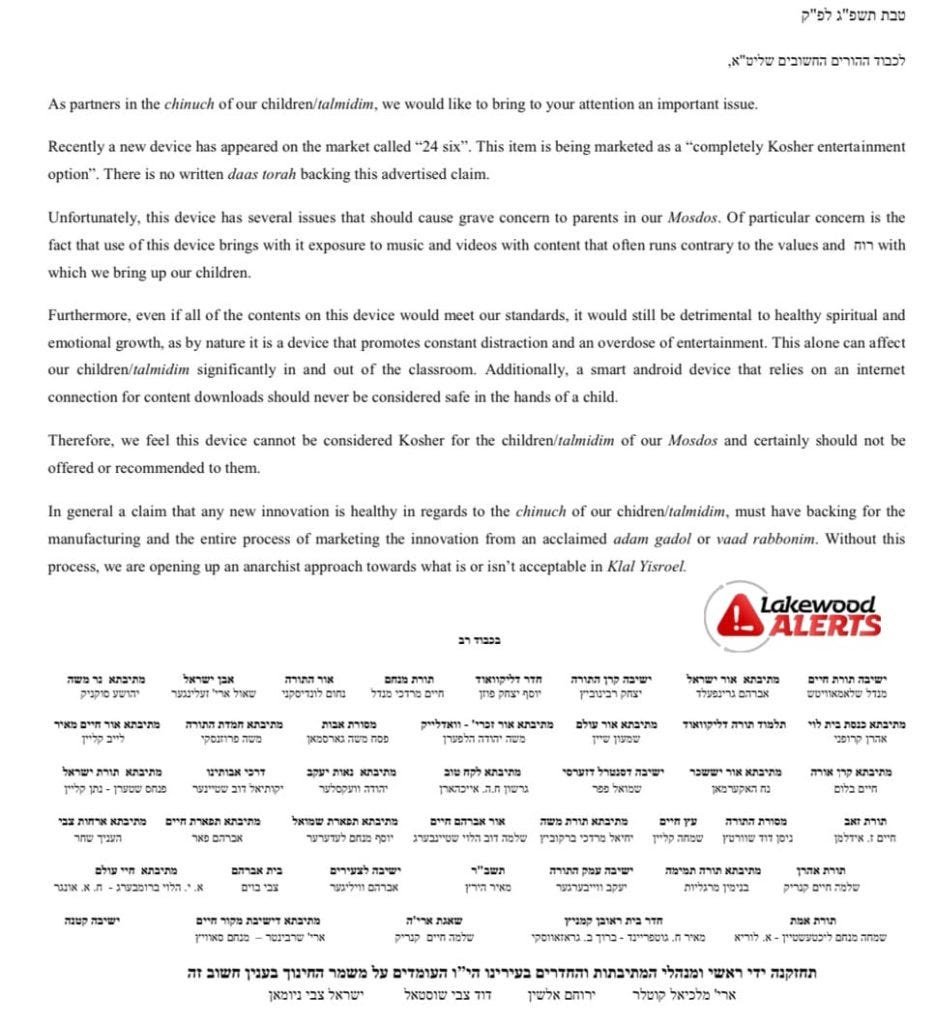DisKlalified
How a "klal" is built
The recent "klalified" series of posts, over and under “klalified,” highlight one of the most glaring issues our society sees today: the lack of individuality and its accompanying woes. This is not a critique on both of those wonderful posts, only an addition (mostly to the first one), which I believe is worth mentioning, despite the fact that I’m not going to say anything novel.
Reb Avigdor Goldberger pointed out that in recent times, the "klal" has taken over as our identity, and the struggle is to try to bring back individuality and allow people to shine again. Reb Avigdor's main point, if I'm understanding correctly, is that there isn't so much room anymore for the major klal work and large-scale building our parents and grandparents needed. We need to relearn to appreciate and cherish the smaller-scale crown achievements; personal siyumim as an example.
The way it was presented sounds like this is supposed to be a "new way" of doing things, a departure from what our parents and grandparents have been doing. But the truth is, the definition of "klal" actually necessitates such an approach. Let me explain.
A healthy klal is only as strong and resilient as the building blocks that make it up. And to bring out the point, let us start smaller: A family is a kind of mini-klal. But the only way for a family to be strong is if the individuals in it are healthy and strong. A guy who has worked on himself emotionally, mentally, spiritually (even physically), will be a better base and foundation for his home than one who hasn't; he isn't busy with his own shortcomings. A woman who knows and appreciates her value, who is in touch with herself and her mission, be it what it may, will have the capability to devote herself to her family and strengthen it.
When strong individuals marry, they expand themselves. They create something bigger than themselves, made up of themselves - a family. Once they are able to give beyond themselves, they can now expend their efforts and strengths on building others. And the recipients, their kids, will receive healthy attention, according to their individual needs and will turn into healthy machines of their own, capable of giving and building up others.
In this very same pattern, a group of strong families - who are created through strong individuals - creates a community. Not just people who happen to live in the same coordinates on the globe, rather a makeup of families who are self-sufficient enough to give beyond themselves and connect with each other.
As the circle gets bigger, the man-power to be able to give becomes exponentially stronger and through that a proper community is built. Social circles, shuls, schools, pirchei and bnos, bikkur cholim etc., and the list goes on. When there is more manpower, the entire community can run and everyone can help each other with their personal shortcomings, and -
A strong community can then serve as a unit in an even larger klal, Klal Yisroel as a whole.
But only because each layer beneath it - the individual, the family, the neighborhood - is strong.
However, in our globalized world, we've reversed the flow. The klal often comes at the expense of the prat. We raise children in systems that grade conformity. We place our children into institutions that don't necessarily focus on helping them individually figure out who they are.
This shows up in education, in how we raise our children, and even in how we relate to leadership.
As an example, the roshei yeshiva of Lakewood aren’t the rebbeim of every Jew. Their kol koreis are for their talmidim, for their communities. And for them, that’s good. But Lakewood is not the world. The words of the Roshei Yeshiva get broadcast to everyone, and people think they're "following the gedolim," but really, they're just applying things out of context.
To be more clear: Lakewood is a yeshiva, a heilige Beis Midrash. A home in Lakewood that actually functions as an extension of this beis midrash - a place without internet, full of Torah and kedusha - for them, something like 24Six is a step down and can even be a slippery slope.
Think about it this way: can you fathom a Rosh Yeshiva telling the bachurim in his yeshiva not to access 24Six on campus?
I can.
Because a Yeshiva is a BM, a place of learning full-time - not getting involved in the idea of outlets etc. - the point is that one can hear why a Rosh Yeshiva would ban something that requires the internet.
With nuance, the Lakewood home that is supposed to be listening to such a kol korei looks like that: an extension of the BM. I know such homes, kedoshim v'tehorim like you've never seen before. For those individuals, far and few in between, the holiest Yidden among us, that kol korei banning 24Six made perfect sense.
But to apply that model to the entire frum world is completely out of touch.
We live in a very globalized world. Everyone hears what other big-name rabbanim are saying, and the "klal" is our guidance, our sense of community. But the truth is that Yeshiva World hock and the broader Jewish community, while it has it’s place, it is not a replacement for a personal Rebbi or a Rav who knows the people and guides his community according to its needs.
The Purpose of a Community
The greatness of a community is in its support system. Most families are strong and self-sufficient, and that is supposed to be the main actor in the growth of an individual.
But sometimes a family falls short (someone gets sick R'l, needs money, treatments), and for that, the community steps in. The community at large comes to play to learn with the boys, to give tzedaka to show up. And even on a simpler level, it's healthy and necessary for a family to be part of something bigger, because that’s what a family is: a unit of a larger community.
Just like in a family, when one kid is struggling, the parents step up - they invest more love, more time, more care, in a healthy klal, the same thing happens. The stronger parts compensate for the weaker ones. But if individuality is crushed from the beginning, if the parts themselves are broken, there's nothing left to give.
We've Become "DisKlalified"
The role of every parent, mechanch, and leader is really to develop individuals. A rebbi isn't really meant to mass-produce students. He’s supposed to help each talmid become himself. A yeshiva isn't supposed to be a factory.
Now, if all the individual bachurim have strong families, they won’t need 100% attention from the Rebbi and they can just soak up his mehalech and forge a strong connection - strong in quality, though small in quantity. But when a bachur needs more, there should be someone to step in.
But the point is that it all begins at the individual level. The only way to fix the Klal is to start where it actually begins: with ourselves.
As Jordan Peterson famously says - before fixing the world - "clean your room."
Be a stronger prat. Be a better oved Hashem. Build a healthier family. Work on becoming the kind of person who has enough to give to others. And that’s, how a klal is built, bottom up, one brick at a time.
There should almost be no individuals (of course there are exceptions) who are exclusively "klal" people. By definition, a “klal individual” is actually someone who has worked on himself, raises his family, and becomes a bigger and better person. He then spills over to the community, with his personal and familial identities firm.
So how do we become reKlalified?
By building our communities bottom up and not letting ourselves get sucked into a system, letting it do all the lifting.
By first focusing on ourselves.
But since this is true, the Roshei Yeshiva and rabonim should be wary of that and act accordingly. Just saying.






Overall, good points. But I wish you would acknowledge what's so wrong with this kol koreh.
"Because a Yeshiva is a BM, a place of learning full-time - not getting involved in the idea of outlets etc."
There are two ways to critique this:
1. Any chacham recognizes the application of ביטולה זו היא קיומה. Outlets are essential to prevent burnout and to maintain a healthy life balance among many other things. Denying the needs of bachurim and their families for outlets is blind to reality and the thought that somehow a BM ought to be blind to reality and impose a way of life that is purely aspirational and not realistic is actually a surefire way to undermine their success actually living according to the Torah, including learning to be a healthy parent and husband who can raise a family according to the derech hatorah, which - I hope we agree - is FAR more fundamental than a little more super-advanced lomdus.
2. More importantly, there is a distinction all these posts have implicitly acknowledged between an absolutist and ask encompassing vision of right and wrong coming from the top down - even for the limited Klal it may be addressed to - and guidance that individuals can use to apply to their own situations and families. This kol koreh to me, with all due respect to those who signed it, is a classic failure in chinuch. It should have raised the concerns ("grave concerns" is too severe, leaving no room for individual application) that people should be careful with it, even very careful, and that while some parents may find it appropriate for some or all their children, it should not be accepted as purely kosher and that people should consult their rabbanim for more guidance. Also, this will be a bombshell that cannot work for too many people and will only alienate them from the roshei yeshiva who simply set standards too high for their whole Klal to allow for any individualism. This kind of kol koreh - even for it's intended audience - is much responsible for the problem as anything and, in my view, cannot be explained away.
I don't get why anyone would think that there isn't room for Klal work today.
I think there is more room for Klal work than any time in the last 60 odd years. I feel like our community is standing at a crossroads in many ways as it shifts from a tiny minority to transitioning to a majority colture (in Israel and even in NY and NJ) and many major Klal issues will need to be tackled (the shiduch crisis and parnasa (housin/tuition) crisis are 2 obvious examples.
I think the truth is that we have been conditioned (for a a good reason, perhaps,but that s its own discussion) NOT to take our own initiative. Yet, if you look at those who did much for Klal Yisroel postwar it was very much their own drive and initiative pushing them.